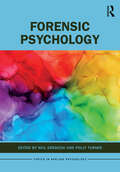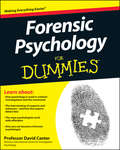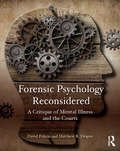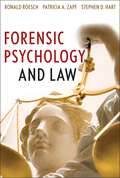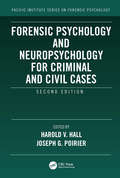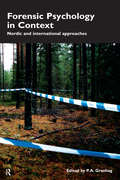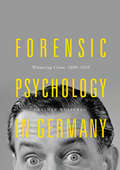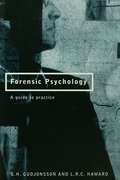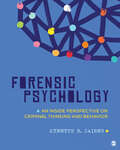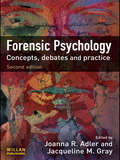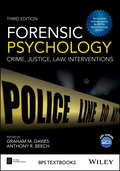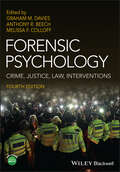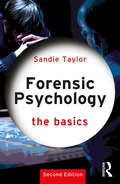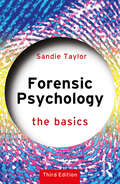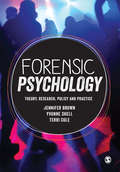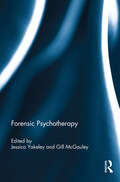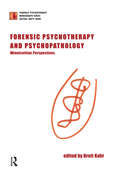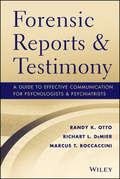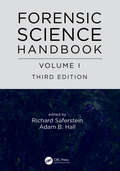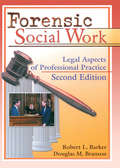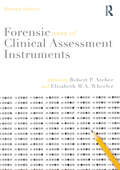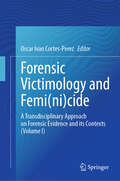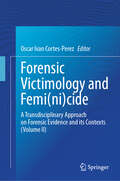- Table View
- List View
Forensic Psychology (Topics in Applied Psychology)
by Neil Gredecki Polly TurnerDrawing on psychological theory and research, this text outlines the core roles of the forensic psychology profession, providing students with a broad overview of the field and bringing to life the work of the forensic psychologists. Written by leading UK practitioners and researchers working in a range of contexts, it invites students to reflect on how psychological literature helps us to understand people in contact with the justice system. Forensic psychology is continually evolving as a discipline and profession, shaping and responding to changes in legal processes, policies and provision. This book highlights the work of forensic psychologists, which covers a range of areas including assessment and intervention, applied research, consultancy and the training and development of staff working in forensic services such as secure services or community settings. Case studies are used to link psychological theory to practice, showcasing the latest developments in the field, and providing students with insights into best practice. The book further challenges myths in the field, encouraging students to humanise human harm and to apply compassion in their understanding of offending behaviour. Each chapter includes tasks and scenarios to promote critical thinking around theory and practice in what is an exciting time to work in this evolving field. As a field of study and a profession within the systems for criminal and civil justice, forensic psychology overlaps and interacts with many other areas within and outside of psychology. As such, this volume details the contribution of forensic psychology to a range of presentations and organisational and professional issues, and is an ideal resource for courses in forensic psychology.
Forensic Psychology For Dummies
by Ian Rankin David CanterA fascinating guide on the psychology of crimeThinking of a career that indulges your CSI fantasies? Want to understand the psychology of crime? Whether studying it for the first time or an interested spectator, Forensic Psychology For Dummies gives you all the essentials for understanding this exciting field, complemented with fascinating case examples from around the world.Inside you'll find out why people commit crime, how psychology helps in the investigative process, the ways psychologists work with criminals behind bars - and how you too can become a forensic psychologist. You'll discover what a typical day is like for a forensic psychologist, how they work with the police to build offender profiles, interview suspects or witnesses, and detect lies!Covers the important role psychology plays in assessing offendersExplains how psychology is applied in the courtroomExplains complicated psychology concepts in easy-to-understand termsIf you're a student considering taking forensic psychology or just love to learn about the science behind crime, Forensic Psychology For Dummies is everything you need to get up-to-speed on this fascinating subject.
Forensic Psychology Reconsidered: A Critique of Mental Illness and the Courts
by David Polizzi Matthew R. DraperForensic psychology is where psychology meets the criminal justice system. An understanding of the intersection of criminal law and psychological issues relating to criminal responsibility is critical for criminal justice students. This accessible text focuses on the criminal law implications of forensic psychology as it relates to topics such as competency to stand trial, state of mind at the time of the crime, suicide by cop, and involuntary psychiatric medication administered in custody. Unlike more traditional texts on this topic, which are primarily concerned with the clinical practice of forensic psychology, this book focuses on critical thinking as it relates to these topics. Each chapter presents a critical analysis of the topic under study, going beyond merely identifying the legal parameters of criminal responsibility to explore the ethical, philosophical, and theoretical foundations of that concept.
Forensic Psychology and Law
by Patricia A. Zapf Stephen D. Hart Ronald RoeschPraise for Forensic Psychology and Law"In Forensic Psychology and Law, three internationally known experts provide exceptional coverage of a wide array of topics that address both the clinical applications of forensic psychology and the role of psychological science in understanding and evaluating legal assumptions and processes."--Norman Poythress, PhD, Research Director and Professor, Louis de la Parte Florida Mental Health Institute, Dept. of Mental Health Law and Policy"Forensic Psychology and Law is a major contribution to the teaching of law and psychology. Roesch, Zapf, and Hart offer a timely, comprehensive, and succinct overview of the field that will offer widespread appeal to those interested in this vibrant and growing area. Outstanding."--Kirk Heilbrun, PhD, Professor and Head, Department of Psychology, Drexel University"In this volume, three noted experts have managed to capture the basic elements of forensic psychology. It is clearly written, well organized, and provides real world examples to hold the interest of any reader. While clarifying complex issues, the authors also present a very balanced discussion of a number of the most hotly debated topics."--Mary Alice Conroy, PhD, ABPP, Psychological Services Center, Sam Houston State UniversityA Comprehensive, Up-to-Date Discussion of the Interface Between Forensic Psychology and LawForensic Psychology and Law covers the latest theory, research, and practice in the field and provides thought-provoking discussion of topics with chapters on:Forensic assessment in criminal and civil domainsEyewitness identificationPolice investigations, interrogations, and confessionsCorrectional psychologyPsychology, law, and public policyEthics and professional issues
Forensic Psychology and Neuropsychology for Criminal and Civil Cases (Pacific Institute Series on Forensic Psychology)
by Harold V. Hall and Joseph G. PoirierToday's increasingly sophisticated psychological and neuropsychological assessments allow for a greater understanding, and improved evaluations, in forensic psychology. By integrating discussions of modern psychological and neuropsychological tests, with extant civil and criminal cases, Forensic Psychology and Neuropsychology for Criminal and Civil Cases, Second Edition serves as a fully-updated, professional resource outlining modern behavioral science’s impact on the legal system. This second edition synthesizes the theoretical, empirical, and clinical literature, examining it through the lens of case application. The book is divided into three parts to look at foundational legal, ethical and applied issues; criminal forensic evaluations; and civil forensic evaluations. Chapters new to this edition address substance abuse and intoxication, interviewing and interrogation, criminal profiling, faked amnesia and recall skills, post-concussive syndrome (PCS), post-traumatic stress disorder (PTSD), and trends and research directions. Clinicians, researchers and psychologists practicing in any number of related fields will be able to address relevant questions from both criminal-forensic and civil-forensic perspectives. Key features: Presents the latest advances in methodology and technology to assist forensic professional in assessment and case formulation in the search for ground truth in applied settings Outlines base rates for forensic areas of concern, especially helpful in evaluation, report writing and courtroom testimony as an expert witness Addresses complex criminal issues such as competency to stand trial, criminal responsibility, mitigating defenses, and violence risk Forensic Psychology and Neuropsychology for Criminal and Civil Cases, Second Edition is an invaluable resource to clinicians, experts witnesses, and legal professionals—a helpful adjunct for mental health experts to formulate sound direct and cross-examination strategies, and eliciting suggestions for forensically-related treatment and intervention.
Forensic Psychology in Context: Nordic and International Approaches
by P. A. GranhagAcademics and researchers from the Nordic countries (Sweden, Iceland, Norway, Finland) have made a particularly strong contribution internationally to the rapidly developing disciplines of forensic and legal psychology. This book brings together the leading authorities in the field to look systematically at the central issues and concerns of their subject, looking at both investigative psychology and psychology in court. Forensic Psychology in Context reflects the results of research in the Nordic countries themselves, but each chapter situates this work within a broader comparative and international context. The book is a major contribution to the subject, and will be essential reading for anybody with interests in this field.
Forensic Psychology in Germany
by Heather WolfframThis book examines the emergence and early development of forensic psychology in Germany from the late nineteenth century until the outbreak of the Second World War, highlighting the field’s interdisciplinary beginnings and contested evolution. Initially envisaged as a psychology of all those involved in criminal proceedings, this new discipline promised to move away from an exclusive focus on the criminal to provide a holistic view of how human fallibility impacted upon criminal justice. As this book argues, however, by the inter-war period, forensic psychology had largely become a psychology of the witness; its focus narrowed by the exigencies of the courtroom. Utilising detailed studies of the 1896 Berchtold trial and the 1930 Frenzel trial, the book asks whether the tensions between psychiatry, psychology, forensic medicine, pedagogy and law over psychological expertise were present in courtroom practice and considers why a clear winner in the “battle for forensic psychology” had yet to emerge by 1939.
Forensic Psychology: A Guide to Practice
by G.H. Gudjonsson L.R.C. HawardForensic Psychology explains the history and application of the discipline. It details the various kinds of psychologist involved in the field, the sort of evidence each might produce, and how it can be applied. The authors cover topics such as:* offender profiling* psychometric testing* expert testimony* psychological autopsy* polygraph testing* professional and ethical problems* training needsA handy reference tool and a practical guide, Forensic Psychology is essential reading for forensic psychologists, clinical psychologists, lawyers and professionals who need to understand the nature and application of psychological evidence in judicial proceedings.
Forensic Psychology: An Inside Perspective on Criminal Thinking and Behavior
by Kenneth B. CairnsForensic Psychology: An Inside Perspective on Criminal Thinking and Behavior offers undergraduates a concise, accessible introduction to the field of forensic psychology. With more than 20 years of experience as a forensic psychologist working with incarcerated people, Dr. Kenneth B. Cairns provides a balance between not just forensics and psychology, but also between theory and practical application. Grounded in the cognitive-behavioral approach and evidence based-practices and research, this text will focus on often-overlooked areas, such as the experiences of victims and first responders and the psychopathy of individuals convicted of mass murder, spree killing, and serial killing.
Forensic Psychology: An Inside Perspective on Criminal Thinking and Behavior
by Kenneth B. CairnsForensic Psychology: An Inside Perspective on Criminal Thinking and Behavior offers undergraduates a concise, accessible introduction to the field of forensic psychology. With more than 20 years of experience as a forensic psychologist working with incarcerated people, Dr. Kenneth B. Cairns provides a balance between not just forensics and psychology, but also between theory and practical application. Grounded in the cognitive-behavioral approach and evidence based-practices and research, this text will focus on often-overlooked areas, such as the experiences of victims and first responders and the psychopathy of individuals convicted of mass murder, spree killing, and serial killing.
Forensic Psychology: Concepts, Debates and Practice
by Joanna R. Adler Jacqueline M GrayThis book brings together academics, practitioners and experts in the field of forensic psychology to demonstrate the scope of the discipline and push its parameters. Its aim is to go beyond introductory texts to challenge perceptions, to raise questions for research and to pose problems for practice. The editors hope to inspire and stimulate debate about how forensic psychology can aid the practice of justice. The book is divided into six sections, addressing key topics from the discipline: investigation and prosecution; testimony and evidence; serious and persistent offending; treatment as intervention; intervention and prevention and punishment and corrections. The contributors are drawn from the UK, the USA and Australia.This updated, revised and significantly expanded edition develops the picture of diversity and depth of forensic psychology; considers ways in which the discipline has progressed and identifies challenges for its future sustainability and growth. includes a new section on treatment as intervention with contributions on personality disordered offenders; anger control group work with forensic psychiatric inpatients; and developments in treatment for drug misuse offenders additional chapters throughout including contributions on UK police interviews; the investigation and prosecutoin of rape; the effect of gender in the courtroom; forensic psychology and terrorism; the aetiology of genocide; self harm in prisons; post-corrections reintegration and many more an innovative textbook on forensic psychology exploring application of the subject and setting forensic psychology in a broader context demonstrates ways in which forensic psychology can aid the practice of criminal justice This book will be essential reading for students of forensic psychology and practitioners working in the field.
Forensic Psychology: Crime, Justice, Law, Interventions (BPS Textbooks in Psychology)
by Graham M. Davies Anthony R. BeechIntroduces forensic psychology to students and professionals who want to better understand psychology’s expanding influence on the study of law, crime and criminality Forensic psychology is a constantly growing discipline, both in terms of student interest and as a profession for graduates. This book highlights the often sizeable gap between media myths surrounding forensic practice and reality. Editors Graham Davies and Anthony Beech present an exciting and broad range of topics within the field, including detailed treatments of the causes of crime, investigative methods, the trial process, and interventions with different types of offenders and offences. Forensic Psychology: Crime, Justice, Law, Interventions, Third Edition covers every aspect of forensic psychology—from understanding criminal behaviour, to applying psychological theory to criminal investigation, analysing the legal process and the treatment of witnesses and offenders. Each chapter has been thoroughly revised and updated with the latest findings. The book also includes two entirely new chapters—one on psychopathy and crime, the other on female offenders. Drawing on a wealth of experience from leading researchers and practitioners, this new edition will interest and enthuse today’s generation of students. All chapters thoroughly revised and updated Features two brand new chapters Supplemented by additional online resource materials, including related links, multiple choice questions, and PowerPoint slides Authored by a wide-range of experienced forensic psychology professionals Forensic Psychology, Third Edition is essential reading for undergraduates’ first encounter with the subject area and is an excellent introduction for more specialised postgraduate courses.
Forensic Psychology: Crime, Justice, Law, Interventions (BPS Textbooks in Psychology)
by Graham M. Davies Anthony R. Beech Melissa F. ColloffFORENSIC PSYCHOLOGY Complete introduction to forensic psychology and understanding psychology’s expanding influence on the study of law, crime, and criminality Highlighting the often-sizable gap between media myths surrounding forensic practice and reality, Forensic Psychology presents a broad range of topics within the field, including detailed treatments of the causes of crime, investigative methods, the trial process, and interventions with different types of offenders and offenses. To aid in reader comprehension, this Fourth Edition is supplemented with additional online resource materials, including related links, multiple choice questions, and PowerPoint slides. Authored by a wide range of experienced forensic psychology professionals and drawing on a wealth of experience from leading researchers and practitioners, Forensic Psychology includes information on: Psychological approaches to understanding crime and developmental and psychological theories of offendingContributions of neuroscience in understanding risk factors for offending and effects of interpersonal crime on victimsEyewitness evidence, psychopathy, interviewing witnesses and suspects, detecting deception, and offender profiling and crime linkageInterpersonal violence and stalking, judicial processes, safeguarding vulnerable witnesses, criminal responsibilities, and the role of the expert witnessRehabilitation of offenders, risk assessment, treating dangerous offenders, and interventions with female offenders and offenders with intellectual disabilities With comprehensive coverage of the subject and its many important intricacies, the Fourth Edition of Forensic Psychology is essential reading for undergraduates’ first encounter with the subject area and is also an excellent introduction for more specialized postgraduate courses.
Forensic Psychology: The Basics (The Basics)
by Sandie TaylorThis edition of Forensic Psychology: The Basics continues to provide an essential and accessible overview of a dynamic and fascinating discipline. Providing an engaging introduction to the core topics within Forensic Psychology, the text combines a discussion of theory with information about the role of a professional forensic psychologist. This edition has been fully updated throughout to include additional coverage of: Offender profiling and rehabilitation The role of psychology in crime prevention Psychological factors relating to terrorism Established topics including police psychology, the psychology of crime and delinquency, victimology and victim services, and correctional psychology are also considered in this invaluable guide. It will be essential reading for students across a range of disciplines, from psychology to criminology to law, or general readers seeking a concise and jargon-free introduction.
Forensic Psychology: The Basics (The Basics)
by Sandie TaylorThis third edition of Forensic Psychology: The Basics continues to provide an accessible overview of the core topics and theories in this fascinating discipline.The book provides an engaging discussion of core topics and theory in forensic psychology, alongside information about the role of a professional forensic psychologist. In addition to the established topics such as the psychology of crime and criminality, police psychology, victimology and correctional psychology, this edition has been fully updated to include coverage of: The impact of labelling offenders The effectiveness of new assessment Rehabilitation programmes Special topics such as terrorism, the effects of war on ex-service personnel and offender profiling have been updated, and further attention is paid to recent changes to legislation in the UK and other countries. The book also explores the importance of nature and nurture for people who commit offences, with a special focus on how this is relevant to the development of psychopathic tendencies.This invaluable guide is essential reading for students across a range of disciplines, including psychology, criminology and law, as well as general readers seeking a concise and jargon-free introduction to forensic psychology.
Forensic Psychology: Theory, research, policy and practice (Critical Concepts In Psychology Ser.)
by Jennifer Brown Yvonne Shell Terri ColeInstructors - Electronic inspection copies are available or contact your local sales representative for an inspection copy of the print version. 'This fascinating book examines some of the ideological underpinnings of forensic psychological research, policy and practice. It is refreshingly reflective and a significant contribution to the field. I strongly recommend it.' - Professor Graham Towl, Durham University and formerly Chief Psychologist at the Ministry of Justice 'The strength of this book is the complexity of concepts and topics covered mean that it is suitable for students who wish to be challenged.’ - Dr Louise Almond, University of Liverpool 'This is a book for people who like to think. It presents the realities of practice with the challenges of theory and asks the reader to shake off complacency. It is insightful and challenging but most of all, it is very readable.' - Professor Joanna R. Adler, Middlesex University Students of Forensic Psychology need to learn how to combine practical skills such as report writing or assessments with a critical understanding of both theory and the wider political and policy landscape that surrounds the profession. Mapped to the British Psychological Society’s Stage One and Two training requirements for forensic psychologists Forensic Psychology: Theory, Research, Policy and Practice will help you understand how these crucial areas of the profession interact and how they can shape one another. Throughout the text the authors provide a detailed analysis of key concepts, debates and theories while weaving in insights and reflections from key professionals, ensuring you have the necessary knowledge and skills to pass assignments and get past the stage 2 supervised practice requirements en route to becoming a qualified forensic psychologist. This text will be essential reading for all those on MSc Forensic Psychology courses, and will also be a useful reader for those on practitioner doctorates as well as the already qualified needing to keep up with the CPD. The book is also a useful companion to professionals in allied criminal justice professions.
Forensic Psychology: Theory, research, policy and practice (Critical Concepts In Psychology Ser.)
by Jennifer Brown Yvonne Shell Terri ColeInstructors - Electronic inspection copies are available or contact your local sales representative for an inspection copy of the print version. 'This fascinating book examines some of the ideological underpinnings of forensic psychological research, policy and practice. It is refreshingly reflective and a significant contribution to the field. I strongly recommend it.' - Professor Graham Towl, Durham University and formerly Chief Psychologist at the Ministry of Justice 'The strength of this book is the complexity of concepts and topics covered mean that it is suitable for students who wish to be challenged.' - Dr Louise Almond, University of Liverpool 'This is a book for people who like to think. It presents the realities of practice with the challenges of theory and asks the reader to shake off complacency. It is insightful and challenging but most of all, it is very readable.' - Professor Joanna R. Adler, Middlesex University Students of Forensic Psychology need to learn how to combine practical skills such as report writing or assessments with a critical understanding of both theory and the wider political and policy landscape that surrounds the profession. Mapped to the British Psychological Society's Stage One and Two training requirements for forensic psychologists Forensic Psychology: Theory, Research, Policy and Practice will help you understand how these crucial areas of the profession interact and how they can shape one another. Throughout the text the authors provide a detailed analysis of key concepts, debates and theories while weaving in insights and reflections from key professionals, ensuring you have the necessary knowledge and skills to pass assignments and get past the stage 2 supervised practice requirements en route to becoming a qualified forensic psychologist. This text will be essential reading for all those on MSc Forensic Psychology courses, and will also be a useful reader for those on practitioner doctorates as well as the already qualified needing to keep up with the CPD. The book is also a useful companion to professionals in allied criminal justice professions.
Forensic Psychotherapy
by Jessica Yakeley and Gill McGauleyForensic psychotherapy explores the roots of violent, sexual and antisocial behaviour. It is a relatively recently created discipline that applies psychoanalytic knowledge to the assessment, management and treatment of mentally disordered offenders, forming a bridge between traditional forensic psychiatry – with its focus on diagnosis and risk – and traditional psychotherapy – with its focus on understanding why things happen. As a discipline, forensic psychotherapy seeks to understand the conscious and unconscious motivations that underpin specific offending behaviours. We need to understand not only the detail of the crime, but also the offender as a whole person within his environment, including the criminal justice environment. It aims to understand the perpetrator, the victim, and the victim within the perpetrator.In this collection, leading international experts in forensic psychotherapy explore the different aspects and developments within the field. These include first hand experiences of shaping the emerging discipline within the UK, Europe and the United States; working therapeutically with high-risk offenders in prisons and secure hospitals; exploration of female violence and work with incarcerated mothers and babies; and the latest developments in forensic psychotherapy training. This book will be of interest to professionals and academics working within the fields of forensic mental health, criminal justice, psychiatry, psychology, criminology, and sociology. This book was originally published as two special issues of Psychoanalytic Psychotherapy.
Forensic Psychotherapy and Psychopathology: Winnicottian Perspectives (The Forensic Psychotherapy Monograph Series)
by Brett KahrThis exceptional book adds to the fast growing area of forensic psychotherapy and shows the relevance of Winnicott's work to therapy with some of the most deprived in our society. Contributors:Brett Kahr; Jennifer Johns; Estela Welldon; Joan Raphael-Leff; Valerie Sinason; Jeannie Milligan; Donald Campbell; Em Farrell; Peter Giovacchini; Charles Socarides; Murray Cox.
Forensic Reports and Testimony
by Randy K. Otto Richart Demier Marcus BoccacciniForensic Reports & Testimony: A Guide to EffectiveCommunication for Psychologists and Psychiatrists provides aroadmap for the mental health professional who wants to provideconsistently accurate, defensible, and useful reports and testimonyto the legal system. Authors Randy K. Otto, Richart L. DeMier, andMarcus Boccaccini, recognized experts in the field, cover allaspects of the process, including preparing affidavits and reports,preparing for depositions, and testifying. Every written or spoken communication for the courts must beclear and precise, and distinguish between facts, inferences, andopinions. This book uniquely:*Shows the critical differences between forensicpsychological reports and the clinical reports psychologists andpsychiatrists are accustomed to writing*Includes and explains important maxims of forensic reportwriting, including separating facts from inferences, focusing onoffering expert opinions, explaining why you think what you think,and connecting the dots between facts and conclusions*Provides numerous examples of experts' testimony,affidavits, reports-with commentary and critiquesExpert forensic work deserves to be presented in a clear,precise, and understandable way so that it is useful to attorneys,judges, and juries. Forensic Reports & Testimonyprovides the guidelines and models forensic psychologists andforensic psychiatrists need to make that happen.
Forensic Science Handbook, Volume I
by Richard Saferstein Adam B. HallOriginally published in 1982 by Pearson/Prentice-Hall, the Forensic Science Handbook, Third Edition has been fully updated and revised to include the latest developments in scientific testing, analysis, and interpretation of forensic evidence. World-renowned forensic scientist, author, and educator Dr. Richard Saferstein once again brings together a contributor list that is a veritable Who’s Who of the top forensic scientists in the field. This Third Edition, he is joined by co-editor Dr. Adam Hall, a forensic scientist and Assistant Professor within the Biomedical Forensic Sciences Program at Boston University School of Medicine. This two-volume series focuses on the legal, evidentiary, biological, and chemical aspects of forensic science practice. The topics covered in this new edition of Volume I include a broad range of subjects including: • Legal aspects of forensic science • Analytical instrumentation to include: microspectrophotometry, infrared Spectroscopy, gas chromatography, liquid chromatography, capillary electrophoresis, and mass spectrometry • Trace evidence characterization of hairs, dust, paints and inks • Identification of body fluids and human DNA This is an update of a classic reference series and will serve as a must-have desk reference for forensic science practitioners. It will likewise be a welcome resource for professors teaching advanced forensic science techniques and methodologies at universities world-wide, particularly at the graduate level.
Forensic Social Work: Legal Aspects of Professional Practice, Second Edition
by Robert L. Barker Douglas M. BransonExplore the legalities and pitfalls of forensic social work!Forensic Social Work: Legal Aspects of Professional Practice, Second Edition examines the professional specialty of forensic social work which involves testifying in court as an expert witness, investigating cases of possible criminal conduct, and assisting the legal system in such issues as child custody disputes, divorce, child support, juvenile delinquency, spouse or child abuse, and placing individuals in mental hospitals. As a student or professional social worker, you will explore a variety of ethical and legal issues, such as malpractice, licensing, credentialing, marketing for forensic clients, and presenting effective courtroom testimony. Current and fact-filled, this new edition discusses the origins of forensic social work and offers implications for future practice.New material in this edition includes a chapter on how to establish a forensic social work practice, with information on how to bring in clients, generate new referrals and make other important contacts. Another new chapter expands on the first edition's discussion of implanted memory versus recovered memory and the ways that social workers use and often misuse this information. A third new chapter examines credentialing requirements for forensic social work. Forensic Social Work details legal conflicts you may face and offers suggestions on how to deal with these situations. Rich with examples, some aspects of forensic social work that you will learn about are: separating the role of the expert witness from the role of the fact witness while testifying understanding the motivations, payments, and positive incentives for entering the field of forensic social work avoiding malpractice lawsuits by understanding the criteria for liability guidelines for action when laws and ethics collide preparing for litigation duty-to-warn laws writing reports and contracts for the litigious society using the problem-oriented (SOAP) record distinguishing implanted memory from recovered memory and understanding how witnesses and social workersmay misuse remembered informationComplete with a glossary, case examples, and information on how to obtain clients, new referrals, and other contacts, Forensic Social Work gives you a thorough look at the profession of forensic social work. You will explore the legal and ethical issues that come with this profession, learn the credentials needed to become a forensic social worker, and discover how to adequately market yourself in the field. Forensic Social Work will prepare you for the circumstances that may arise and help you to professionally and successfully overcome future challenges.
Forensic Uses of Clinical Assessment Instruments
by Robert P. Archer Elizabeth M. A. WheelerThis book provides, in a single volume, an extensive, research-based evaluation of the most popular clinical assessment tools as applied in forensic settings. These widely used instruments often require important modifications in their administration and interpretation when used for forensic purposes, and it is vital that the clinician is intimately familiar with their correct application, as well as their limitations. The test instruments included are analyzed by senior figures in the field of psychological assessment who are uniquely qualified to discuss them because they have either had a crucial role in the development of the tests, or they have dedicated their careers to advancing our understanding of these clinical assessment measures. Each chapter begins with a summary of the development of the assessment instrument in its more traditional applications in clinical settings, and then considers its utilization in forensic settings. The types of forensic issues which have been addressed with that instrument are reviewed, and an illustrative case example is given which reflects the types of uses and limitations of the assessment technique when applied in a forensic context. New in this edition are a chapter on the MMPI-2-RF and separate chapters for the adult and youth versions of the Hare Psychopathy Checklist. Psychologists using assessment instruments in applied forensic settings will find this to be a valuable and practical source of information, as will attorneys wishing to gain an understanding of the application of these psychological assessment approaches in the courtroom.
Forensic Victimology and Femi(ni)cide: A Transdisciplinary Approach on Forensic Evidence and its Contexts (Volume I)
by Oscar Ivan Cortes-PerezThis handbook of forensic victimology focuses on femi(ni)cide contexts, offering instructional tools for legal and forensic investigation from a transdisciplinary perspective. Drawing from cross-national experiences, particularly in Australia and Mexico, it provides essential resources for identifying, investigating, analyzing, interpreting, and understanding lethal gender-based victimization through physical forensic evidence. Spanning ten chapters, the book illustrates and develops standards of professional practice from the initial victimization report through specialized procedures, including crime scene processing, medical evidence collection, and entomology. It establishes the functionality and relevance of each stage of forensic investigation, alongside theoretical and legal considerations regarding various femicide contexts, such as intimate partner femicide, femicide-suicide, and child femicide. Additionally, it discusses due diligence standards in forensic investigation and legal considerations to avoid unlawful evidence. Ideal for professionals in legal and forensic fields addressing gender-based victimization, this volume also serves as a handbook for students in forensic-related areas such as legal and forensic medicine, criminalistics, criminology, and criminal law.
Forensic Victimology and Femi(ni)cide: A Transdisciplinary Approach on Forensic Evidence and its Contexts (Volume II)
by Oscar Ivan Cortes-PerezThis book, the second volume in the set, offers an in-depth, global analysis of femicide and feminicide from legal, sociological, and criminological perspectives. It addresses the lack of coverage of forensic investigation, case solvability, forensic evidence, and victimological approaches. Volume II not only focuses on descriptive aspects of femicide and feminicide, but also tackles practical issues related to access to justice and the importance of forensic methods in solving feminicide cases. By expanding on current developments in gender-based murder, it integrates applied forensic and legal settings, adopting a victim-centered approach to explain contexts of victimization in court. It is ideal for professionals working in legal and forensic settings towards gender-based victimization. It serves also as a handbook for students in areas related to Forensic areas such as legal and forensic medicine, criminalistics, criminology and criminal law.
